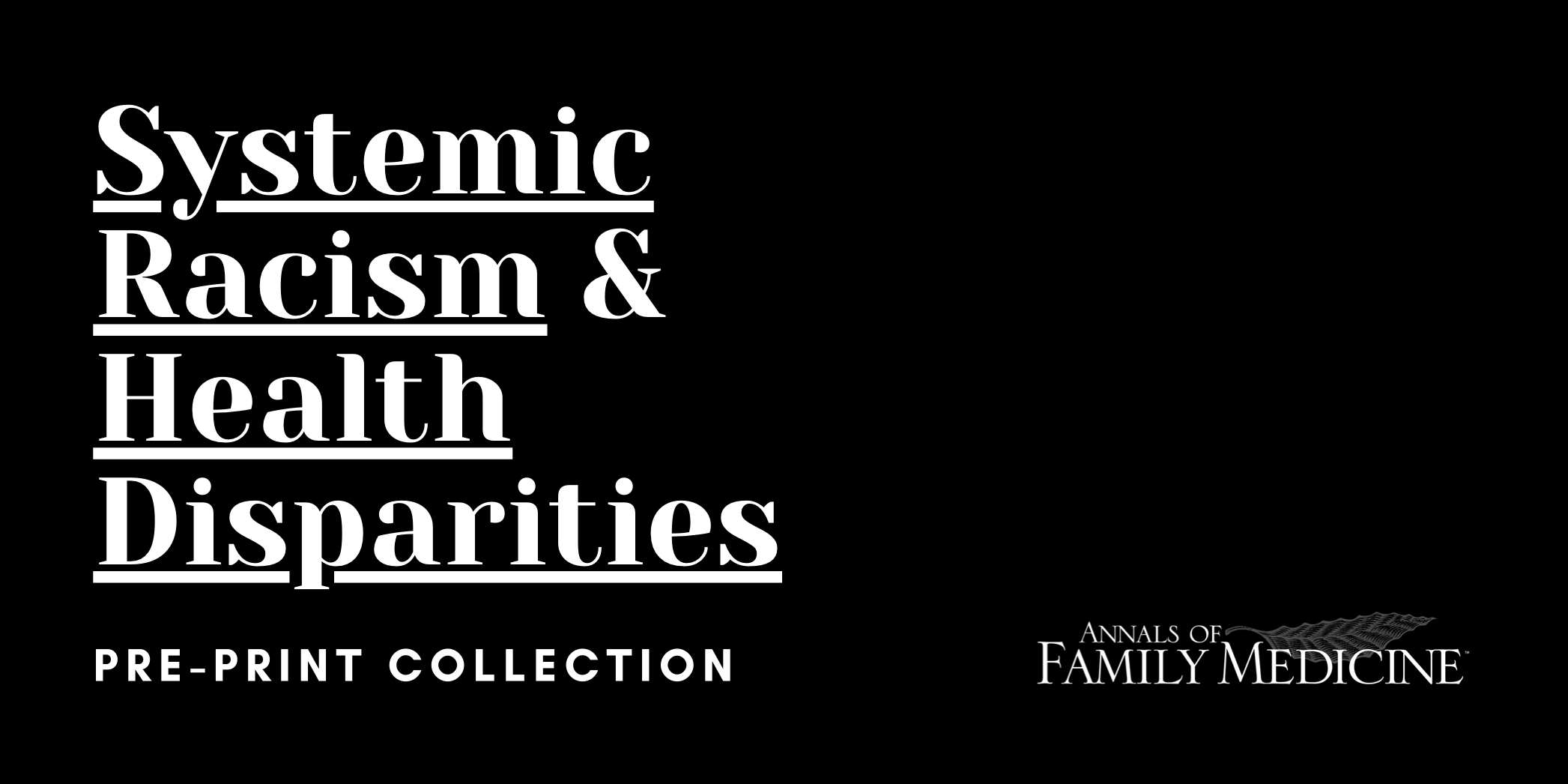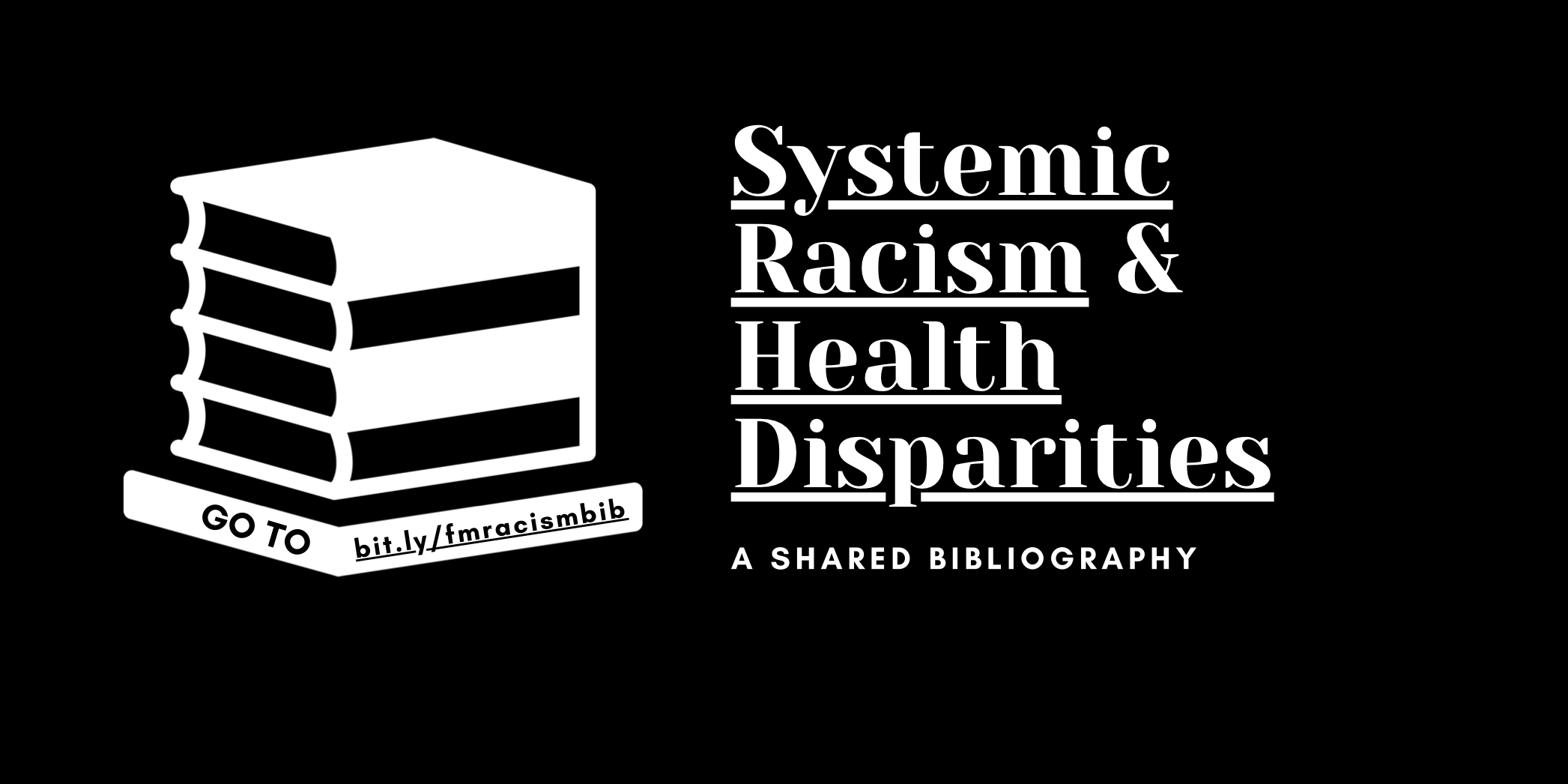An index of open-access racism-related content relevant to primary care, as well as a bibliography of literature on racism and health disparities. For notifications when new content is added to this collection, please follow @AnnFamMed on Twitter.
Last updated 25 Jul 2023 7:58 EST
Systemic Racism and Health Disparities: A Statement from Editors of Family Medicine Journals
Sumi M. Sexton, MD; Caroline R. Richardson, MD; Sarina B. Schrager, MD, MS, FPM; Marjorie A. Bowman, MD; John Hickner, MD, MSc; Christopher P. Morley, PhD, MA; Timothy F. Mott, MD; Nicholas Pimlott, MD, PhD; John W. Saultz, MD; Barry D. Weiss, MD
The year 2020 was marked by historic protests across the United States and the globe sparked by the deaths of George Floyd, Ahmaud Arbery, Breonna Taylor, and so many other Black people. The protests heightened awareness of racism as a public health crisis and triggered an antiracism movement. The editors of several North American family medicine publications have come together to address this call to action and share resources on racism across our readerships. Published, January, 2021. DOI: 10.1370/afm.2613
Community Support Persons and Mitigating Obstetric Racism During Childbirth
Elle Lett, et al
Published May 2023
Disparities in Shared Decision-Making Research and Practice: The Case for Black American Patients
Yaara Zisman-Ilani, et al
Published February 2023
Our Souls Look Back and Wonder: Reflections on Belonging and Being Invisible in Medicine
Alicia Gonzalez-Flores, et al
Published February 2023
The Current State of Antiracism Curricula in Undergraduate and Graduate Medical Education: A Qualitative Study of US Academic Health Centers
Gina Fatahi, et al
Published February 2023
Revolutionizing Health Professions Admissions to Acheive an Inclusive Workforce
Mytien Nguyen
Published February 2023
A Curated Curriculum Collection to Support Social Determinants of Health Education for the Health Professions
Clare Petrie, et al
Published February 2023
Let's Not Reinvent the Wheel: Using Communities of Learning and Practice to Address SDOH and Advance Health Equity
Memoona Hasnain, et al
Published February 2023
Resculpting Professionalism for Equity and Accountability
Jessica P. Cerdena
Published November 2022
Conceptualizing, Contextualizing, and Operationalizing Race in Quantitative Health Sciences Rsearch
Elle Lett, et al
Published March 2022
Implementing High-Quality Primary Care Through a Health Equity Lens
Azza Eissa, et al
Published March 2022
Peer Coaching to Improve Diabetes Self-Management Among Low-Income Black Veteran Men: A Mixed Methods Assessment of Enrollment and Engagement
Cassie D. Turner, et al
Published November 2021
Lower Likelihood of Burnout Among Family Physicians From Underrepresented Racial-Ethnic Groups
Montgonery Douglas, et al
Published July 2021
Dear White People
Krys E. Foster, et al
Published January 2021
Family Medicine, Community, and Race: A Minneapolis Practice Reflects
Shailendra Prasad, et al
Published January 2021
What Are You? A Biracial Physician on Nuanced Racism
Emma Lo
Published January 2021
You Can't Heal What You Don't Reveal
Shailendra Prasad MBBS MPH, Andrea Westby MD, Renee Crichlow MD
Published, January, 2021
Cherry Blossoms, COVID-19, and the Opportunity for a Healthy Life
Dr. Marshall Chin
Published, January, 2021
Access, Equity, and Neutral Space: Telehealth beyond the Pandemic
Benjamin Kaplan
Published, January, 2021
Racism in Medicine: Shifting the Power
J. Nwando Olayiwola
Published May 2016
White Privilege in a White Coat: How Racism Shaped my Medical Education
Max J. Romano
Published May 2018
Patients’ Beliefs About Racism, Preferences for Physician Race, and Satisfaction With Care
Frederick M. Chen
Published March 2005
Pursuing Equity: Contact With Primary Care and Specialist Clinicians by Demographics, Insurance, and Health Status
Robert L. Ferrer
Published November 2007
A Shared Bibliography on Systemic Racism and Health Disparities
A bibliography of scholarship generated by the family medicine community on the topic of racism in medicine.



